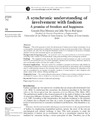Identificador persistente para citar o vincular este elemento:
https://accedacris.ulpgc.es/jspui/handle/10553/75960
| Campo DC | Valor | idioma |
|---|---|---|
| dc.contributor.author | Díaz Meneses, Gonzalo | en_US |
| dc.contributor.author | Nieves Rodríguez, Julia | en_US |
| dc.date.accessioned | 2020-11-25T12:47:19Z | - |
| dc.date.available | 2020-11-25T12:47:19Z | - |
| dc.date.issued | 2010 | en_US |
| dc.identifier.issn | 1361-2026 | en_US |
| dc.identifier.other | WoS | - |
| dc.identifier.uri | https://accedacris.ulpgc.es/handle/10553/75960 | - |
| dc.description.abstract | Purpose - This work proposes to study the phenomenon of fashion not as being evolutionary but as a consumption response that is mediated by consumers having a certain perception of time. This work also proposes not only that the temporal dimension seems to be essential in the process of fashion adoption but also that emotional aspects are predominant.Design/methodology/approach - An empirical work was conducted based on structural equation modelling with a sample of 341 individuals, using path modelling with a multi-group analysis.Findings - The empirical results show that the needs for social acceptance not only do not arouse interest in new tendencies but even entail unpleasant emotions such as anxiety. Moreover, fashion is more emotionally positive if it has the quality of future.Practical implications - Not only would it be profitable to promote involvement with fashion by transmitting the importance of others, but also the use of social needs in advertising could be unethical since it would generate unease in the consumer. Since it is clear that, in fashion, an orientation to the past is accompanied by an increase in negative emotions, it seems logical to reject designers who praise classic styles without offering anything new.Originality/value - The work studies the phenomenon of fashion not as being evolutionary but as a consumption response that is mediated by consumers having a certain perception of time. | en_US |
| dc.language | eng | en_US |
| dc.relation.ispartof | Journal of Fashion Marketing and Management | en_US |
| dc.source | Journal Of Fashion Marketing And Management[ISSN 1361-2026],v. 14 (1), p. 72-+, (2010) | en_US |
| dc.subject | 531211 Comercio | en_US |
| dc.subject | 530401 Consumo, ahorro, inversión | en_US |
| dc.subject.other | Fashion | en_US |
| dc.subject.other | Consumers | en_US |
| dc.subject.other | Individual Psychology | en_US |
| dc.title | A synchronic understanding of involvement with fashion: a promise of freedom and happiness | en_US |
| dc.type | info:eu-repo/semantics/Article | en_US |
| dc.type | Article | en_US |
| dc.identifier.doi | 10.1108/13612021011025447 | en_US |
| dc.identifier.scopus | 77049093228 | - |
| dc.identifier.isi | 000212081400006 | - |
| dc.contributor.authorscopusid | 9132741600 | - |
| dc.contributor.authorscopusid | 55478670800 | - |
| dc.identifier.eissn | 1758-7433 | - |
| dc.description.lastpage | + | en_US |
| dc.identifier.issue | 1 | - |
| dc.description.firstpage | 72 | en_US |
| dc.relation.volume | 14 | en_US |
| dc.investigacion | Ciencias Sociales y Jurídicas | en_US |
| dc.type2 | Artículo | en_US |
| dc.contributor.daisngid | 1487958 | - |
| dc.contributor.daisngid | 15891538 | - |
| dc.description.numberofpages | 17 | en_US |
| dc.utils.revision | Sí | en_US |
| dc.contributor.wosstandard | WOS:Meneses, GD | - |
| dc.contributor.wosstandard | WOS:Rodriguez, JN | - |
| dc.date.coverdate | Febrero 2010 | en_US |
| dc.identifier.ulpgc | Sí | en_US |
| dc.contributor.buulpgc | BU-ECO | en_US |
| dc.description.ssci | SSCI | |
| item.fulltext | Con texto completo | - |
| item.grantfulltext | open | - |
| crisitem.author.dept | GIR IUCES: Dirección de Marketing, RSC y Empresa Familiar | - |
| crisitem.author.dept | IU de Cibernética, Empresa y Sociedad | - |
| crisitem.author.dept | Departamento de Economía y Dirección de Empresas | - |
| crisitem.author.dept | GIR Organización y dirección de empresas (Management) | - |
| crisitem.author.dept | Departamento de Economía y Dirección de Empresas | - |
| crisitem.author.orcid | 0000-0001-6260-385X | - |
| crisitem.author.orcid | 0000-0001-9796-038X | - |
| crisitem.author.parentorg | IU de Cibernética, Empresa y Sociedad | - |
| crisitem.author.parentorg | Departamento de Economía y Dirección de Empresas | - |
| crisitem.author.fullName | Díaz Meneses, Gonzalo | - |
| crisitem.author.fullName | Nieves Rodríguez, Julia | - |
| Colección: | Artículos | |
Citas SCOPUSTM
8
actualizado el 08-jun-2025
Citas de WEB OF SCIENCETM
Citations
6
actualizado el 18-ene-2026
Visitas
46
actualizado el 10-ene-2026
Descargas
148
actualizado el 10-ene-2026
Google ScholarTM
Verifica
Altmetric
Comparte
Exporta metadatos
Los elementos en ULPGC accedaCRIS están protegidos por derechos de autor con todos los derechos reservados, a menos que se indique lo contrario.
